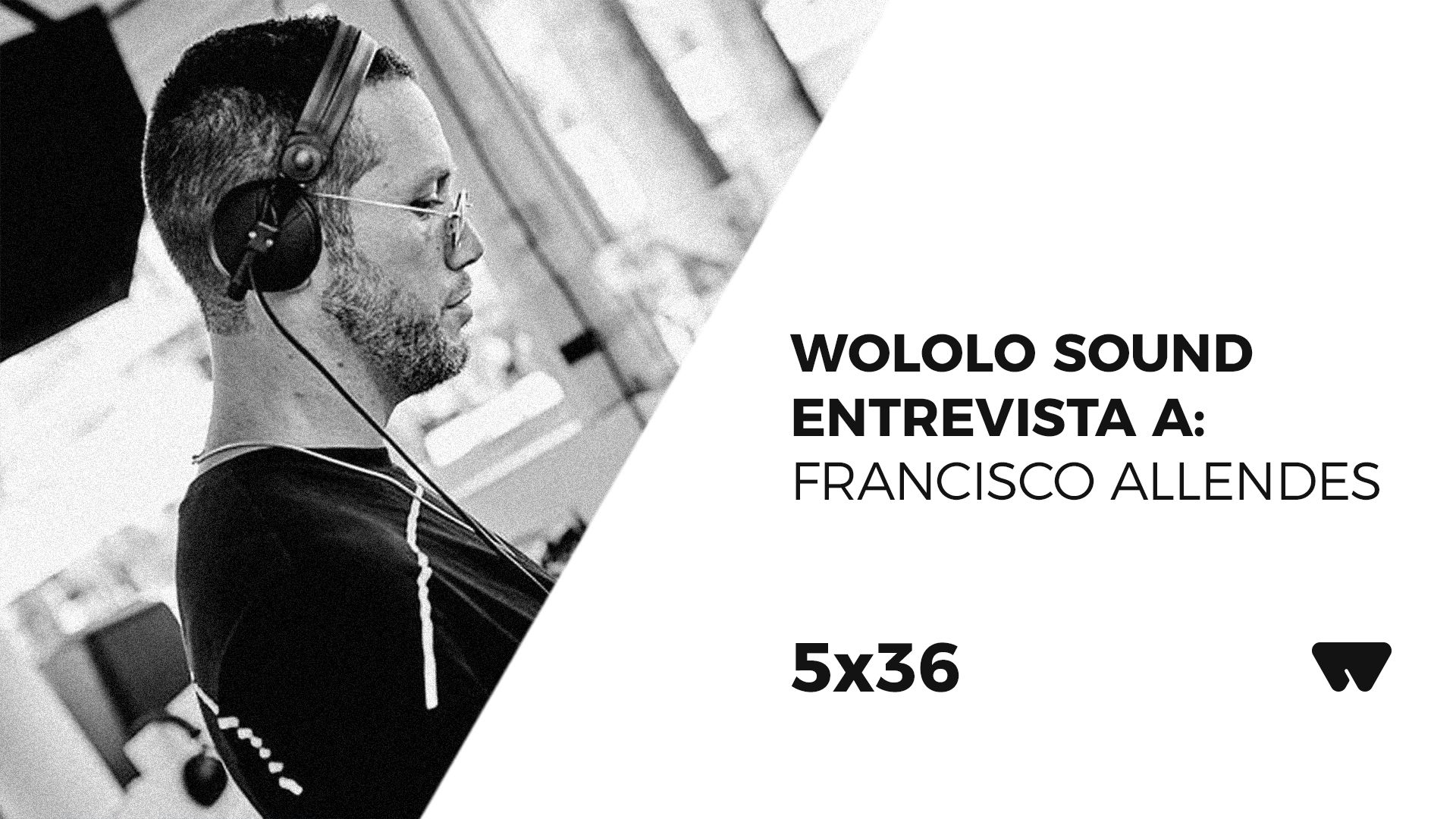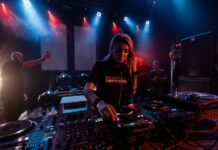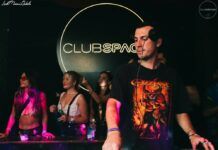Hoy os traemos una nueva entrevista y nuestro invitado de hoy viene de Sudamérica. Francisco Allendes es una de las principales figuras sudamericanas del tech house, a quien hemos podido ver varias veces pinchando en fiestas de Ants, la emblemática fiesta ibicenca, y en grandes lugares como Ushuaïa, BPM Festival o Fabrik en donde lo volveremos a ver el 30 de abril. Además lo hemos visto estrenando su música en grandes sellos del género como Desolat, Sola o Armada Subjekt.
WS: Hola Francisco! Muchas gracias por atender a nuestro medio en España. Primero de todo vamos a presentarte un poco para quien no te conozca lo suficiente: ¿Quién es Francisco Allendes y cómo entro en la escena de la música electrónica?
FA: Nací en Iquique, al norte de Chile, pero a los 5 años nos fuimos a vivir a Santiago, la capital. Ahí estudié violín por unos 8 años, pasé al rock, a los sintetizadores y con la investigación llegué a la música electrónica. Durante mis años de universidad fui DJ de pachanga pero duré muy poco porque la electrónica se apoderó de mi visión musical.
WS: Hi Francisco! Thank you so much for attending our media in Spain. First of all, let’s introduce you for those who don’t know you: Who is Francisco Allendes and how did he entered into the electronic music scene?
FA: I was born in Iquique, in the northern part of Chile, but when I was 5, we moved to Santiago, the capital. There I studied violin for 8 years, I moved to rock, then to synths and by investigating, I arrived to electronic music. During my university years I used to be a DJ but that facet lasted not so much because electronic music captured my musical vision.
WS: Hablemos un poco de tus raíces. Vienes de Chile, ¿cómo es la escena allí? ¿Tuviste complicaciones en el inicio de tu carrera? ¿Tuviste que salir de tu país para ganarte la vida como DJ/productor?
FA: He tenido la fortuna de encontrarme muchas veces en el lugar adecuado y el momento correcto. Como todos los DJs comencé pinchando toda la noche por 2 pelas y llevando todo mi equipo. En Chile en ese momento no había una gran escena a nivel de clubes y dinero pero sí había mucha gente con ganas de hacer cosas – fiestas y música – El dueño del bar donde yo tocaba un día hizo una fiesta de tech house en un espacio abierto al lado del aeropuerto, los aviones pasaban por ahí durante la fiesta; claramente se convirtió en la fiesta mas cool donde yo era residente; como hacía música se la mostraba a los otros DJs y en poco tiempo empecé a pinchar bastante por Santiago y luego por todo Chile. Era joven, vivía con mis padres y estaba todavía estudiando así que el tema de ganar o no dinero no era una prioridad. Pasaron un par de años y entendí que era muy difícil vivir de esto seriamente en Chile así que empecé a hacer planes para venir a vivir a Europa
WS: Let’s talk about your roots. You come from Chile, how is the scene there? Did you find any difficulties at the beginning of your career? Did you have to leave your country to make a living as a DJ/Producer?
FA: I had the fortune of finding myself several times on the right place in the right moment. As all DJs I started playing all night long for no money and carrying all my setup with me. In Chile at that moment there wasn’t a big scene in terms of clubs and money but there was a lot of people with the aim of doing things -parties and music- The owner of the bar where I used to play, one day organized a tech house party in an opened space next to the airport, planes passed though there during the party; clearly it became the coolest party where I was the resident DJ; as I was making music I showed it to other DJs and in a short period of time I started playing regularly in Santiago and afterwards, all around Chile. I was young, I lived with my parents and I was still studying, so earning or not money wasn’t a priority. After two years time I understood that it was really difficult to live from that seriously in Chile, so I started making my own plans in order to move to Europe.
WS: A nivel musical, ¿Cuáles fueron tus influencias?
FA: Como dije antes, mi primer acercamiento con la música fue a través del violín, la música clásica, tocar en orquestas y grupos de cámara. Con eso aprendí toda la teoría y el lenguaje para expresar lo que quiero en la música. Pero las influencias mas profundas que tengo vienen del rock y en particular del rock y jazz de los años 70. La discografía de Frank Zappa y Pink Floyd me la sé de memoria, por nombrar los 2 mas importantes. En muchos de mis primeros discos los mas fanáticos seguro pueden reconocer algún micro-trozo que me he robado de estas grandes obras
WS: In musical terms, which were your influences?
FA: As I said before, my first approach with music was through the violin, classical music, playing in orchestras and chamber groups. With that I learned all the theory and the language to express what I want in music. But the deepest influences I have come from rock and in particular, from rock and jazz from the 70s. Frank Zappa and Pink Floyd’s discography I know it from memory, to noun two of the most important. In loads of my first records, the true fans can surely recognize some kind of micro pieces that I stole from these masterpieces.
WS: Desde hace un tiempo llevas pinchando en muchas partes del mundo además de sacar música en sellos de gran calidad, ¿en qué momento te diste cuenta de que puedes vivir de esto? ¿Hubo algún punto de inflexión, algún hecho importante que alzase tu carrera definitivamente?
FA: Mi primer bolo pagado fue a los 21 años, y la cosa fue siempre mejorando pero no me daba para vivir como quería, así que me puse un límite : si para el día de mi cumpleaños numero 30 no había logrado alcanzar cierto nivel, entonces me buscaría un trabajo de verdad que me asegurara el futuro, o que por lo menos me permitiera vivir bien y ahorrar algo. Estudié en la universidad 6 años y terminé la carrera, si la música no me daba para vivir entonces tenía un plan B.
A los 29 años me invitaron a ser residente en Ushuaïa así que decidí que no me iba a buscar otro trabajo y que valía la pena seguir empujando con la música.
WS: For a while now, you’ve been playing in many parts of the world as well as releasing music on high quality stamps, at what point did you realize that you can live on this? Was there a turning point, some important fact that definitely raised your career?
FA: My first paid bolo was at age 21, and the thing was always improving but I did not get to live as I wanted, so I set a limit: if by the day of my 30th birthday I had not reached a certain level, then I I would look for a real job that would assure me the future, or at least allow me to live well and save something. I studied at the university for 6 years and finished the degree, if the music did not give me to live then I had a plan B.
At the age of 29 they invited me to be a resident in Ushuaïa so I decided that I was not going to look for another job and that it was worthwhile to continue pushing with music
WS: Eres uno de los artistas frecuentes en ANTS, una casa a la que suponemos le debes mucho: ¿Cómo comenzó la relación con la emblemática fiesta ibicenca? ¿Qué nos puedes contar desde qué empezaste a pinchar en sus eventos?
FA: El año 2010 llegue a Ibiza para ser residente de Ushuaïa Ibiza, que todavía era un chiringuito en la playa, y pinchaba ahí 2-3 veces por semana. El 2011 Ushuaïa se transformo en el mega club – hotel que hoy conocemos, la línea musical se abrió a mas estilos así que había menos espacio para lo que pinchaba yo, pero cuando en 2013 apareció ANTS – que se presentaba como la fiesta underground del club – hubo de nuevo una cancha donde pude jugar. Ese año hice 4 fechas b2b con Paola Poletto. En 2016 me invitaron a ser residente de la fiesta y a viajar con ANTS por el mundo. Esto claramente le dio un giro alucinante a mi carrera, al darme la oportunidad de subir a algunos de los mejores escenarios del mundo
WS: You are one of the frequent artists in ANTS, a house to which we suppose you owe a lot: How did the relationship with the emblematic Ibicencan party begin? What can you tell us since you started DJing at their events?
FA: The year 2010 I arrived in Ibiza to be a resident of Ushuaïa Ibiza, which was still a beach bar on the beach, and I played there 2-3 times a week. The 2011 Ushuaïa was transformed into the mega club – hotel that we know today, the musical line was opened to more styles so there was less space for what I played, but when in 2013 ANTS appeared – which was presented as the club’s underground party – There was again a court where I could play. That year I made 4 b2b dates with Paola Poletto. In 2016 I was invited to be a resident of the party and to travel with ANTS around the world. This clearly gave an amazing turn to my career, giving me the opportunity to climb some of the best stages in the world
WS: Hablando de Ibiza, suponemos que tras varias temporadas en la isla ya podrás hacerte una idea de lo que significa nuestro “paraíso” particular: ¿Qué tal ves la escena ibicenca en este momento? ¿Qué nos puedes adelantar de la temporada 2019?
FA: Han pasado casi 9 años desde que llegue a la isla, llegué solo pero he formado una familia : me casé en San Josep, mi hijo nació en Ibiza, y creo que seguiremos viviendo en la isla por bastantes años más. Cada fin de semana viajo a diferentes partes del mundo a pinchar y cuando aterrizo de nuevo en Ibiza me doy cuenta que este es el mejor lugar del mundo para vivir.
Cada verano es diferente y creo que lo único que vemos constante en los años es el cambio. Hay gente nostálgica que prefiere la isla de antes – cuando llegué en 2010 escuchaba mucho a la gente decir “Ibiza ya no es lo que era”, y es una frase que se repite cada año más y más! Este año es un año de cambios, no sabría decirte que esperar porque cada verano hay una sorpresa, una revelación, un fracaso y alguna reaparición, pero es algo que no se puede realmente predecir, el tiempo lo dirá.
WS: Talking about Ibiza, we assume that after several seasons on the island you can already get an idea of what our particular “paradise” means: How do you see the Ibiza scene at this moment? What can you tell us about the 2019 season?
FA: It has been almost 9 years since I arrived on the island, I arrived alone but I have formed a family: I got married in San Josep, my son was born in Ibiza, and I believe that we will continue to live on the island for many more years. Every weekend I travel to different parts of the world to play and when I land again in Ibiza I realize that this is the best place in the world to live.
Every summer is different and I think the only thing we see constant in the years is change. There are nostalgic people who prefer the island before – when I arrived in 2010 I listened a lot to people saying “Ibiza is not what it used to be”, and it is a phrase that is repeated every year more and more! This year is a year of changes, I could not tell you what to expect because every summer there is a surprise, a revelation, a failure and some reappearance, but it is something that can not really be predicted, time will tell.
WS: Te hemos visto en nuestro país varias veces y de hecho en abril vuelves a Fabrik junto a grandes artistas. ¿Qué opinas de nuestro país y de nuestro público? ¿Tienes ganas de volver a Fabrik?
FA: España me encanta, mi primera experiencia en Europa fue en Zaragoza donde viví 2 años y fue un período donde aprendí muchísimo. Viví también un tiempo en Barcelona y ahora en Ibiza. Fue en esta ciudades donde aprendí lo que es el clubbing y donde aprendí a pinchar discos de verdad, donde creé mi concepto de DJ set. Por eso me encanta España y su publico.
¿Existirá algún DJ que no le guste pinchar en Fabrik? No lo creo….
WS: We’ve seen you in our country many times and in fact in April you’re back to Fabrik together with great artists. Which is your view about our country and our crowd? Are you excited for coming back to Fabrik?
FA: I love Spain, my first experience in Europe was in Zaragoza where I lived for two years and it was a period when I learned a lot. I lived as well in Barcelona and now in Ibiza. It was in those cities where I learned what clubbing is and where I really learned to play records, where I created my own DJ set concept. That’s why I love Spain and its crowd. Will exist any DJ that won’t like to play in Fabrik? I don’t think so…
WS: En 2007 creaste tu sello Andes Music junto a Marcelo Rosselot, ¿qué te hizo dar este paso? ¿Por qué sólo hemos visto 9 referencias desde su creación? ¿Veremos nuevo contenido próximante?
FA: En ese momento queríamos darnos a conocer a nivel sudamericano y pensamos que un sello era la mejor manera. Marcelo y yo ya habíamos editado algunos discos por sellos europeos y entre los contactos que teníamos logramos conseguir como planchar y distribuir los discos globalmente. Haciendo esto podíamos ser el primer sello de música electrónica basado en Chile que pusiera discos de vinilo en todo el mundo, un proyecto ambicioso en el que decidimos embarcarnos y puedo decir que nos fue bastante bien. Toda esa generación de artistas chilenos que salió del país a dar la vuelta por el mundo editaron con nosotros, y tuvimos remixers internacionales muy potentes.
Pero como todos sabemos, por el año 2010 el mercado del vinilo se había venido abajo y cada vez era mas difícil conseguir los resultados que queríamos; después de sacar la sexta referencia me desligué del sello y actualmente lo maneja Marcelo con otro socio.
WS: In 2007 together with Marcelo Rosselot, you created your label Andes Music. For which reason did you take this leap? Why we’ve only seen 9 references since its creation? Can we expect brand new content soon?
FA: At that time we wanted to make ourselves known at the South American level and we thought that a label was the best way. Marcelo and I had already released some albums by European labels and among the contacts that we had we managed to get as ironing and distributing discs globally. Doing this we could be the first electronic music label based in Chile to put vinyl records around the world, an ambitious project in which we decided to embark and I can say that it went pretty well. All that generation of Chilean artists who left the country to go around the world edited with us, and we had very powerful international remixers.
But as we all know, by the year 2010 the vinyl market had collapsed and it was getting harder and harder to get the results we wanted; After taking out the sixth reference I got rid of the seal and now Marcelo handles it with another partner.
WS: En este 2019 aún no te has estrenado como productor, ¿tienes algo entre manos?
FA: Tengo varios proyectos por salir a la luz y un remix bastante importante, pero por ahora solo puedo anunciar mi aparición en Moon Harbour a mediados de año.
WS: In 2019 you still haven’t debuted as a producer, is there something coming up?
FA: I’ve got many projects to release and a very important remix, but by now I can only announce my appearance at Moon Harbour in the middle of the year.
Preguntas cortas/Short questions:
- A city to live?/¿Una ciudad para vivir?: Ibiza
- A sport and a favourite team?/¿Un deporte y equipo favorito?: Crossfit, Isla Blanca!
- Fav song of the moment?/¿Canción favorita actual?: Nathan Barato feat. Wayne Tenant – Over You
- Favourite food?/¿Comida favorita?: Ceviche
- ¿Club or festival?: Paso palabra
- Best club you have been in?/¿Mejor club en el que hayas estado?: Ushuaïa Ibiza
- A DJ to share stage?/¿Un DJ con el que compartir cabina?: Matthias Tanzmann
- What 3 young artists do you recommend to us?/¿Qué 3 artistas jóvenes nos recomiendas?: Miane, Irregular Live, Nico Rozas
- A non electronic song?/¿Una canción que no sea electrónica?: Mahavishnu Orchestra – One Word








